
We speak with Juliette Touma, director of communications at UNRWA, about deepening starvation in Gaza. Israel has accused the United Nations agency of failing to distribute aid in Gaza, but Touma says Israel continues to block most supplies from entering the territory. Touma notes that there are 6,000 trucks filled with food, medical supplies and other necessities ready to enter Gaza. “We’ve been waiting for a green light to start the wheels of those trucks for nearly five months now,” she says.
Transcript
NERMEEN SHAIKH: Palestinian health officials in Gaza say Israeli attacks have killed at least 111 people and injured more than 800 others just in the past 24 hours. Among the dead are 91 people killed while seeking aid. Meanwhile, Al Jazeera reports a young Palestinian man from Rafah has died from starvation, the 155th hunger-related death since Israel began its assault and siege on Gaza nearly two years ago.
This week, the world’s leading hunger monitoring system warned the, quote, “worst-case scenario of famine” is playing out in the Gaza Strip, with widespread starvation, malnutrition and disease, due to Israel’s siege. The Integrated Food Security Phase Classification warns the only path to stopping further deaths and catastrophic human suffering is for Israel to allow for the unimpeded, large-scale flow of humanitarian aid into Gaza.
As Gaza’s starvation crisis grows deeper for more than 2 million Palestinians living under Israel’s siege, Republicans in the U.S. Congress are seeking to tighten a ban on the United Nations agency that, until recently, delivered humanitarian aid to Palestinians. Last week, the Republican-dominated House Appropriations Committee voted in favor of a package to slash foreign aid programs, while tightening a financial blockade on the U.N. Relief and Works Agency for Palestinian Refugees in the Near East, known as UNRWA. Until Israel banned its operations in January, UNRWA was the main distributor of humanitarian aid in Gaza.
AMY GOODMAN: This is former Israel spokesperson Eylon Levy in a video posted this week on X, blaming the United Nations for withholding aid to Gaza.
EYLON LEVY: This is a monument to the catastrophic failure of the United Nations to deliver aid into Gaza, hundreds upon hundreds of pallets of aid just rotting in the sun instead of being delivered to the people who need it.
AMY GOODMAN: For more, we begin today’s show with UNRWA’s director of communications, Juliette Touma, speaking to us from Amman, Jordan.
Juliette, thanks for joining us. Can you respond to Israel saying it’s UNRWA, it’s the United Nations, that’s stopping the flow of aid into Gaza?
JULIETTE TOUMA: Yeah. Thanks for having me on.
Look, for UNRWA, we have 6,000 trucks waiting for the green light, except they are not at Gaza’s borders. They are in Jordan, where I am today, and they are in Egypt, loaded with medicines, food and hygiene supplies. We’ve been waiting for a green light to start the wheels of those trucks for nearly five months now.
NERMEEN SHAIKH: So, could you describe, Juliette, what is the situation in Gaza? And when was the last time that UNRWA employees, former employees, international employees, were able to get into the territory? Israel has been denying visas, we understand, for UNRWA employees.
JULIETTE TOUMA: We have 10,000 local Palestinian staff who work with UNRWA. They are spread across the Gaza Strip. They hold the fort while the international staff of the agency are banned from going into the war-torn enclave. They are the doctors and the nurses that keep our medical points open. They are the ones who are able to distribute whatever we have left of basic supplies. They’re the drivers, and they’re the emergency operators who keep the shelters for the displaced families open. But we’ve got to get in so that we can support them, and we’ve got to get those trucks that are stranded in Jordan and Egypt in Gaza, so that together we can distribute to starving people in the Gaza Strip.
NERMEEN SHAIKH: And, Juliette, for people who aren’t familiar, if you could just outline the range of services that UNRWA used to provide within Gaza, the kind of humanitarian aid that was provided, and who’s doing that now?
JULIETTE TOUMA: Sure. So, before the war, the agency UNRWA was providing schooling and education to over 300,000 boys and girls who went to United Nations schools in the Gaza Strip. We also had over 20 clinics that provided primary healthcare to patients in the Gaza Strip. And we also gave, even before the war, because the humanitarian situation was already dire — we provided food about a million people in Gaza. We do something similar in the occupied West Bank. But since the war began, we’ve shifted gears to do more humanitarian work. We’ve, sadly, had to close the schools, and as a result, soon, in September, the children of Gaza would have been deprived of schooling for a third year in a row.
AMY GOODMAN: I wanted to ask you about a recent New York Times article that revealed, quote, “According to two senior Israeli military officials,” the Israeli military found no proof that Hamas was stealing aid provided by the United Nations. Israel has used these accusations for the past two years to restrict food and medical supplies from entering Gaza. Can you talk about the significance of this?
JULIETTE TOUMA: Oh, it’s very significant. Thanks for bringing it up. And there was also a report from USAID that came out also a few days ago along the same line. And basically, you’re absolutely right. This is a claim that the Israeli government and authorities and those who support them have repeated, without any evidence, that the humanitarian assistance that the United Nations was bringing in was devoted to Palestinian armed groups, which is absolutely baseless, and these two reports are proof to that. Those claims were used simply to undermine the work of the United Nations, especially UNRWA. And we all know the disaster of this setup that the American and Israeli governments have put in place and the lives that that organization has taken, while claiming it provides food for people.
NERMEEN SHAIKH: And, Juliette, just finally, before we end, I just want to read from a statement that the head of UNRWA, Philippe Lazzarini, made. This is quoting colleagues of yours in Gaza, who say that the people in Gaza, quote, “are neither dead nor alive. They’re walking corpses.” So, if you could say, Juliette, what are you calling for now?
JULIETTE TOUMA: We’re calling for the siege to be lifted. We are calling for a standard and at-volume flow of humanitarian assistance, managed by the United Nations, including UNRWA. We’re calling for a ceasefire. We are calling for the release of all hostages held in Gaza.
AMY GOODMAN: Juliette Touma, we want to thank you very much for being with us, director of communications for UNRWA, speaking to us from Amman, Jordan. When we come back, a doctor just back from Gaza joins us in our New York studio. Stay with us.
[break]
AMY GOODMAN: “Sow ’Em on the Mountains” by Nora Brown and [Stephanie] Coleman in our Democracy Now! studio.

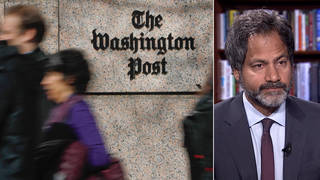
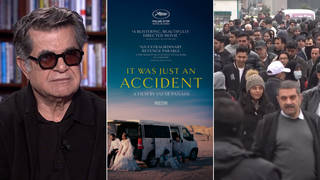
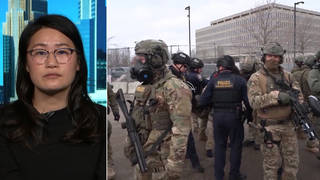
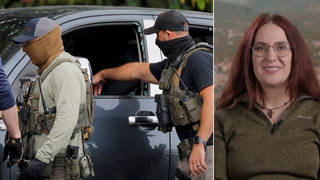

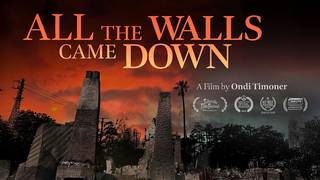
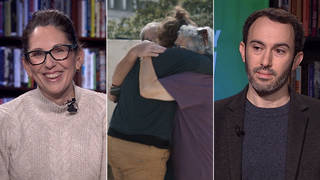


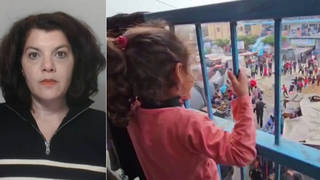

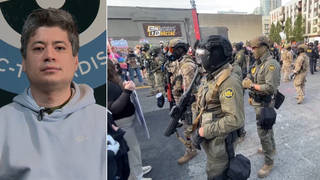
Media Options